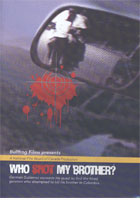
Who Shot My Brother? 2005
Distributed by Bullfrog Films, PO Box 149, Oley, PA 19547; 800-543-FROG (3764)
Produced by Carmen García
Directed by Germán Gutiérrez
DVD, color, 95 min.
College - Adult
Anthropology, Human Rights, International Relations, Labor Relations, Latin American Studies, Political Science, South American Studies
Date Entered: 02/02/2007
Reviewed by Sean Patrick Knowlton, University of Colorado at BoulderWhen Germán Gutiérrez, a Colombian living in Canada, receives a phone call informing him that his brother Óscar, a leftist politician and activist still residing in Colombia, was wounded in a failed assassination attempt, he embarks on a quest to find out who was responsible. Instead of identifying his brother’s would-be murderers, Germán expands the original intent of his documentary to explore the greater historical, social and political issues surrounding the present state of Colombia, a country in which over forty-eight people die violent deaths each day. As a result, Who Shot My Brother? is much more than meets the eye as the director implies that all Colombians are his brothers.
While initially exploring Óscar Gutiérrez’s tumultuous political career, from union organizer to his actions as an elected leftist politician, the documentary soon expands its scope to denounce the suppression of trade unions, the bombing of unarmed civilians by the Colombian military, and the human rights violations of right-wing paramilitaries who also seek immunity for their actions in return for laying down their arms. However, the documentary reserves center stage for the United States government and U.S.-based multinational corporations as fundamental contributors toward the social and economic inequalities in Colombian society that result in the violence. In short, the director seeks to instill in his audience awareness that the drug trade, which is hardly discussed, is merely one factor – a minor one, if not an excuse altogether – for expanded U.S. intervention.
Like Welcome to Colombia (Bienvenue en Colombie), a 2003 documentary made by another Colombian expatriate, this documentary is not impartial. In effect, the documentary supports one side of a political argument, but one that is rarely heard in U.S. classrooms and media outlets. Who Shot My Brother? adequately introduces Colombia’s current political, social and economic dilemmas and provides an alternate viewpoint of the United States’ involvement in Latin America. Unfortunately, its wide scope only scratches the surface of many complex issues and often presents conclusions that require more in-depth analysis than provided in the documentary. For these reasons, this documentary can serve as only one component of a greater classroom discussion on Colombia. The documentary is narrated in English using the words of the director yet spoken by another. The English language narration and subtitles and image quality are excellent.
Recommended for college students, adult viewers, and libraries supporting Latin American studies programs.
Awards
- People's Choice Award, 2005 Festival du Nouveau Cinema (Montreal, Canada)